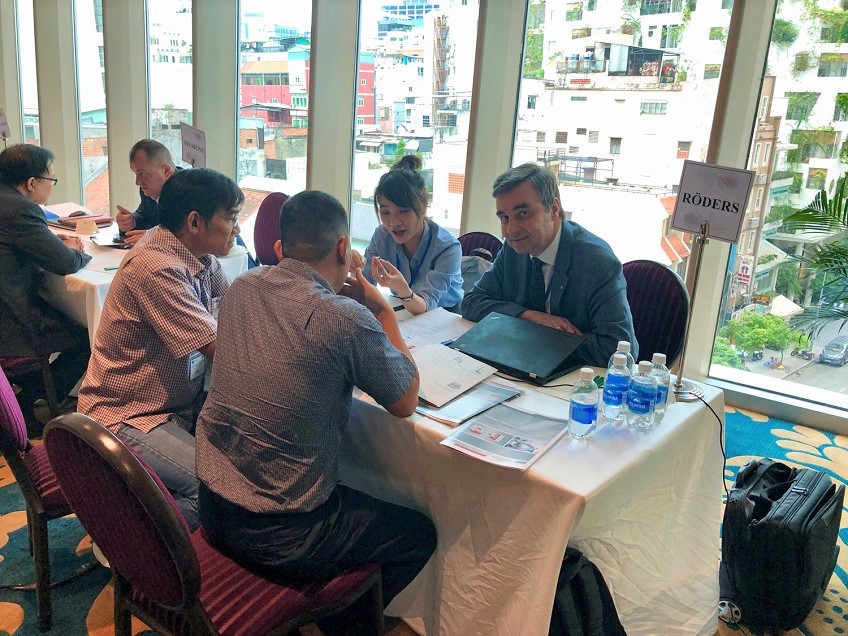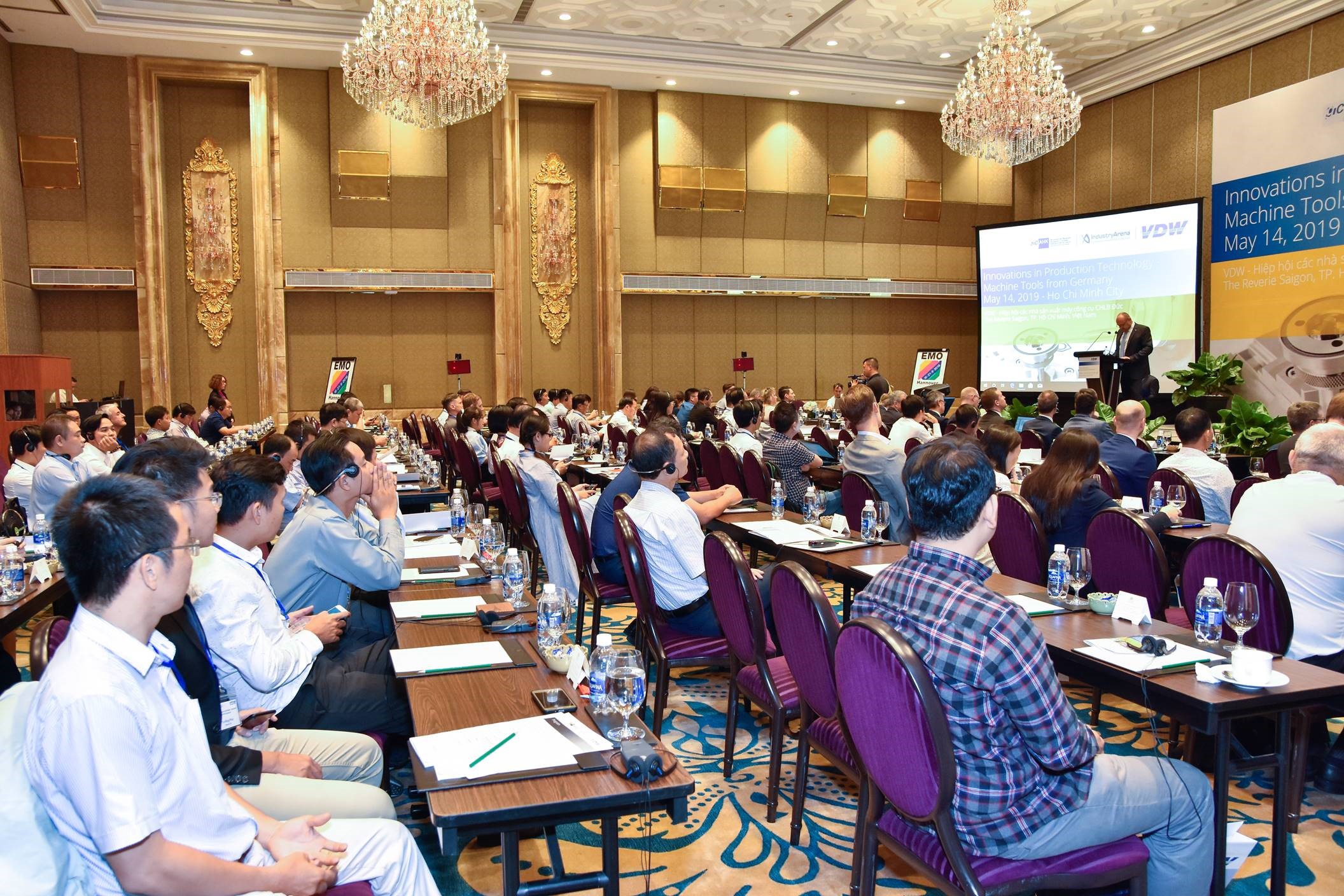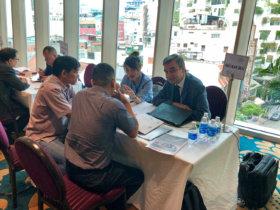Vietnamese economy picking up speed
Germany and German products enjoy an excellent reputation in Vietnam. This was confirmed by Marko Walde, Executive Director of the German-Vietnamese Chamber of Foreign Trade and cooperation partner for the second VDW (Verein Deutscher Werkzeugmaschinenfabriken – German Machine Tool Builders’ Association) Symposium in the Mekong Delta. Vietnam’s economic development is continuing to pick up speed.

Economic researchers are expecting the country’s gross domestic product to have grown by 7 per cent in 2018. Further growth of 6 per cent is predicted for the current year. New free trade agreements are opening up markets and attracting foreign investors to Vietnam. In 2018, the eight most important customer industries for machine tools invested 18 per cent more than in the previous year. A further increase of 8 per cent is expected for 2019. This growth is broad-based. The aviation, medical technology, electrical/electronics, metal production and processing industries and the mechanical engineering sector are investing disproportionately high amounts. “This is why now is the right time for the German machine tool industry to return to Vietnam to showcase its strengths,” said Klaus-Peter Kuhnmünch, who is responsible for organising the VDW Machine Tool Association’s foreign symposia.
Eleven manufacturers presented their manufacturing technology innovations to Vietnamese industry in Ho Chi Minh City on 14 May 2019. These were Alzmetall, Chiron-Werke, Gleason Corporation, Grob-Werke, Heller, Index-Werke, Kapp Niles, Röders, Siemens, Trumpf and J.G. Weisser.
“The timing of the symposium was perfect and it was very well organised. I was also most impressed by the presentations and the selection of German companies,” said Nhat Pham, Senior Manager of Strategic Sourcing Marlow Vietnam, Company II-VI.
Vietnam holds potential for German machine tool manufacturers
Vietnam has established itself as an important link in the international supply chains. This means that its manufacturers must be competitive on the world market, both in terms of price and quality. Accordingly, the country has great demand for sophisticated production technology. Machine tool consumption, an important indicator of the industry’s modernisation efforts, is forecast to grow by 8.2 per cent in 2019.
Mechanical engineering in Vietnam itself is not well developed. Local manufacturers have so far only been able to produce simple devices. Any progress in establishing a modern, efficient industry is therefore heavily dependent on imports of machine tools. Internationally, Vietnam already ranks 10th in the list of import countries, buying in products to the value of 1 billion euros. Together with the United States, Germany is one of the few Western suppliers to sell machines to Vietnam. The Asians – South Korea, China, Japan and Taiwan – dominate here. Since 2014, German machine tool exports to Vietnam have nevertheless risen by more than 150 per cent, with a 215 per cent increase in 2018 alone. Orders from Vietnam have more than tripled recently.
The German machine tool industry offers technologically sophisticated solutions that stand out from the mass-produced offerings of Asian competitors. This was also confirmed by Duong Tuan Ngoc, Vice General Director, HONG KY.,LTD, Ho Chi Minh City: “For this year we have already purchased machine tools from Switzerland. In the future, we will be taking a keen interest in high-precision milling machines from Germany.” Commenting on this development, Kuhnmünch continued: “In view of the Asian dominance and the great potential of the Vietnamese market, German manufacturers must take urgent action if they want to share in the Vietnamese boom.” And Patrick Kemnitz, General Director of Trumpf Vietnam, added: “Having a local presence is important for customer proximity. Service and after sales are the core elements for ensuring further growth.”
Soltau-based Röders GmbH is one of the German companies which is already actively servicing the market and Jürgen Röders, its Managing Director, is taking part in a VDW symposium for the first time. “We are hoping to gain a better understanding of the Vietnamese market through the symposium, and maybe even come away with some concrete orders,” he says. Röders has been operating a contract manufacturing plant in Vietnam since 2013. He sees the biggest problem there as recruiting staff, because technical training is still not advanced enough.
Attracting around 100 participants, the VDW Symposium in Ho Chi Minh City was very well attended. Interest levels were high, the discussions lively. Following the eleven company presentations, 42 bilateral talks were held. As Dr.-Ing. Dirk Prust, Managing Director Technology/Chairman of INDEX-Werke GmbH & Co. KG Hahn & Tessky, underlined: “The B2B meetings are a very useful addition to the presentations. The individual meetings provide a convenient opportunity to get into closer contact. As a machine manufacturer, you find out a lot about the views, experiences and abilities of potential customers through these discussions. That’s very helpful in terms of assessing their needs and giving them professional advice.”
The VDW was also upbeat about the event: “We’ll definitely be back,” said Kuhnmünch. The idea behind the VDW Symposium, which has been organised twice yearly worldwide since 2004, is to develop markets on a sustainable basis and thus to repeat the events at regular intervals.
Background
The German machine tool industry ranks among the five largest specialist groupings in the mechanical engineering sector. It provides production technology for metalworking applications in all branches of industry, and makes a crucial contribution towards innovation and enhanced productivity in the industrial sector as a whole. Due to its absolutely key role for industrial production, its development is an important indicator for the economic dynamism of the industrial sector as such. In 2018, with around 73,000 employees (annual average in 2018, companies with more than 50 employees), the sector produced machines and services worth 17.1 billion euros.




